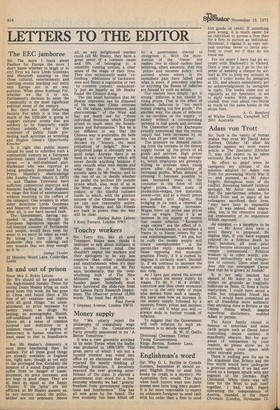Money supply
Sir: "We utterly reject the philosophy of compulsory wage control." So the Conservative Party proudly announced in its 'A Better Tomorrow.'
It was a view generally ascribed to by most Tories when the leaflet was produced in 1969/1970. This great party of which I am but a humble member was voted into office by an electorate that utterly rejected the woolly thinking of meddling Socialists. It decisively rejected the ever growing interference of the state. It elected a government that stood for a free economy whereby we had "greater freedom from government regulations and interference." This has all now gone by the board. The free economy has been killed off by a government elected to strengthen it. With the introduction of the ' freeze ' our leaders live in cloud cuckoo land believing, albeit sincerely, that this 'prices and incomes policy' will succeed where others in the immediate past have failed; and what is more, if precedent teaches us anything the flames of inflation are fanned by such an action.
Our leaders have simply 'got it wrong.' Inflation is not caused by rising prices. That is the . effect of inflation. Inflation is "too much money chasing too few goods." Put another way, the cause of inflation is an increase in the supply of money without a corresponding increase in real goods and services. The Chancellor or the Exchequer proudly announced that the money supply had been increased by no less than 25 per cent last year.
The pressure on demand resulting from the increase in the money supply forces up the prices of all goods and services. High prices lead to demands for wage increase3, which employers are generally willing to concede since rising prices offer the probability of increased profits. When demand is pressing it becomes possible to pass increased costs to the consumer in the form of still higher prices. Most costs of production—wages, raw materials, power—rise, and as a result prices are pushed still higher, this bringing in its train a renewal of demands for wage increases. Wages force up prices and prices force up wages. Thus it is an increase in the supply of money that causes inflation. "Excessive wage claims" are the effect of it. For the Government to introduce a freeze is to blame others for its own mismanagement. " Ah yes, but to curb the money supply will create unemployment" is the parrot-like reply, squawked by those opposing this economic practice. Firstly, if it is curbed by degrees it certainly won't. Secondly, if we continue to increase the money supply it is certain economic ruin.
As I have just stated the answer iS to reduce the money supply by stages. To do it at a stroke tomorrow and thus cause economic ruin — is the only reply of those who detract from such a remedy. We have seen . how an increase in the money. supply followed by a squeeze, freeze, prices and incomes policy — call it what you will — always ends in further rounds of inflation.
To suggest that the Government will curb inflation by such expedience is to delude oneself.
H. W. H. Outfin Divisional Chairman Torbay
Young Conservatives Kings Barton, Summer Lane, Brixham, Devon


















































 Previous page
Previous page